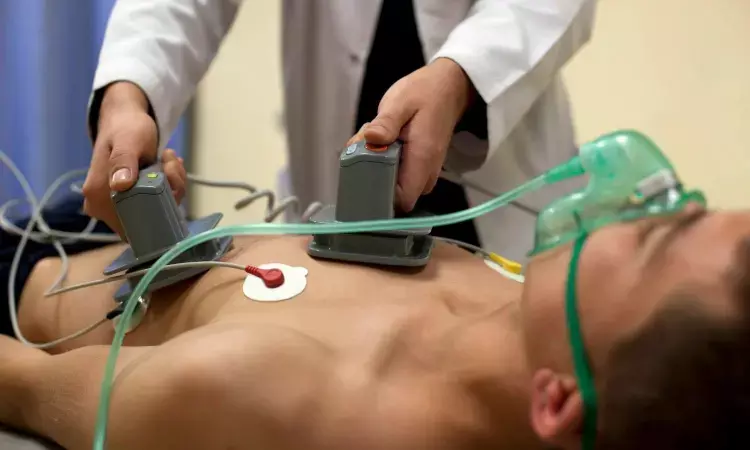- Home
- Medical news & Guidelines
- Anesthesiology
- Cardiology and CTVS
- Critical Care
- Dentistry
- Dermatology
- Diabetes and Endocrinology
- ENT
- Gastroenterology
- Medicine
- Nephrology
- Neurology
- Obstretics-Gynaecology
- Oncology
- Ophthalmology
- Orthopaedics
- Pediatrics-Neonatology
- Psychiatry
- Pulmonology
- Radiology
- Surgery
- Urology
- Laboratory Medicine
- Diet
- Nursing
- Paramedical
- Physiotherapy
- Health news
- Fact Check
- Bone Health Fact Check
- Brain Health Fact Check
- Cancer Related Fact Check
- Child Care Fact Check
- Dental and oral health fact check
- Diabetes and metabolic health fact check
- Diet and Nutrition Fact Check
- Eye and ENT Care Fact Check
- Fitness fact check
- Gut health fact check
- Heart health fact check
- Kidney health fact check
- Medical education fact check
- Men's health fact check
- Respiratory fact check
- Skin and hair care fact check
- Vaccine and Immunization fact check
- Women's health fact check
- AYUSH
- State News
- Andaman and Nicobar Islands
- Andhra Pradesh
- Arunachal Pradesh
- Assam
- Bihar
- Chandigarh
- Chattisgarh
- Dadra and Nagar Haveli
- Daman and Diu
- Delhi
- Goa
- Gujarat
- Haryana
- Himachal Pradesh
- Jammu & Kashmir
- Jharkhand
- Karnataka
- Kerala
- Ladakh
- Lakshadweep
- Madhya Pradesh
- Maharashtra
- Manipur
- Meghalaya
- Mizoram
- Nagaland
- Odisha
- Puducherry
- Punjab
- Rajasthan
- Sikkim
- Tamil Nadu
- Telangana
- Tripura
- Uttar Pradesh
- Uttrakhand
- West Bengal
- Medical Education
- Industry
Subcutaneous ICD reduces lead-related complications without compromising effectiveness of ICD shocks

Implantable cardioverter defibrillators (ICDs) improve survival in patients at risk for cardiac arrest, but are associated with intravascular lead-related complications.
Researchers have found in a randomized multicenter ATLAS trial that Subcutaneous implantable cardioverter defibrillators are associated with 92 percent reduction in lead-related complications typical in patients with ICDs.
The trial conducted on more than 500 persons revealed that subcutaneous implantable cardioverter defibrillators (S-ICDs) reduce perioperative, lead-related complications without significantly compromising the effectiveness of ICD shocks. However they were associated with more early postoperative pain and a trend for more inappropriate shocks.
The study is published in Annals of Internal Medicine.
ICDs improve survival in patients at risk for cardiac arrest but are associated with intravascular lead-related complications. The S-ICD, with no intravascular components, was developed to minimize lead-related complications.
Researchers from McMaster University conducted a randomized multicenter trial of 544 persons with a primary or secondary prevention indication for an ICD. The authors found that S-ICD usage demonstrated a 92 percent reduction of lead-related complications and prevented most lead-related perioperative complications, including myocardial perforation, which can lead to death. They also reported a modest reduction in system reliability with the S-ICD, specifically a trend toward more inappropriate shocks. After a mean follow-up of 2.5 years, there was a nonsignificant 22 percent reduction in the need for surgical ICD revision with the S-ICD and ongoing, longer-term follow-up of ATLAS participants will evaluate the effect that the S-ICD will have on chronic ICD performance and the need for ICD reoperation.
Reference:
Jeff S. Healey, Andrew D. Krahn, Jamil Bashir, Guy Amit, François Philippon, William F. McIntyre, Bernice Tsang, Jacqueline Joza, Derek V. Exner, David H. Birnie, Mouhannad Sadek, Darryl P. Leong, Markus Sikkel, Victoria Korley, John L. Sapp, Jean-Francois Roux, Shun Fu Lee, Gloria Wong, Angie Djuric, Danna Spears, Sandra Carroll, Eugene Crystal, Tom Hruczkowski, Stuart J. Connolly, and Blandine Mondesert, https://doi.org/10.7326/M22-1566
Dr Kamal Kant Kohli-MBBS, DTCD- a chest specialist with more than 30 years of practice and a flair for writing clinical articles, Dr Kamal Kant Kohli joined Medical Dialogues as a Chief Editor of Medical News. Besides writing articles, as an editor, he proofreads and verifies all the medical content published on Medical Dialogues including those coming from journals, studies,medical conferences,guidelines etc. Email: drkohli@medicaldialogues.in. Contact no. 011-43720751


